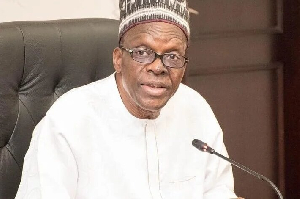The Ghana Revenue Authority (GRA) on Tuesday said its priority is to secure voluntary tax compliance, and that, its focus is on sharing a positive message of national development that encourages people to play their part.
Mr Emmanuel Kofi Nti, GRA Commissioner-General, said: “However, we cannot ignore the fact that paying tax is not optional. We all have both a moral and a legal obligation to pay what is due. While the GRA is keen to reward good compliance, we are also ready to impose sanctions where necessary”.
Mr Nti made the remarks in a speech read on his behalf, at a Tax Amnesty Executive Forum in Accra, organised by the UK-Ghana Chamber of Commerce (UKGCC), in partnership with the GRA, on the theme: "Tax Amnesty - The Way Forward For Your Business".
It created an open platform for small and medium enterprises (SMEs) and multi-national corporations to engage with high ranking officials from the GRA, tax experts and policy shapers.
Mr Nti said when the amnesty period expires after September 30, 2018, the Authority would increase its efforts to tackle non-compliance.
“Taxpayers who are found to be non-compliant, and have failed to take this opportunity, should expect to suffer sanctions to the fullest extent under the law.
“As tax administrators, it goes without saying that taxpayers are our partners in national development. I am therefore calling on taxpayers to partner the GRA so that together we can contribute to building this dear nation,” he added.
He said this amnesty provides an opportunity for all income-earning Ghanaians to step forward and play their role in national development.
Mr Nti noted that, the generous terms that were being offered meant there had never been a better time to regularise tax affairs, put businesses on a legitimate footing, and avoid sanctions and legal consequences in the future.
“I am appealing to all income-earners and businesses to consider whether they need to come forward under the amnesty; to tax consultants to encourage their clients to take it up, if appropriate; and to our friends in the media to raise awareness of the opportunity,” the Commissioner-General said.
He said their tax collection in terms of the United States dollars was stagnant in the region of $6.8 to 6.9 billion, however, for 2017, it rose to $7.6 billion, thus, a break from the trend.
He said, “2017 was a good year for the GRA. It was a year when GRA and taxpayers, exhibited innovation and excellence in revenue mobilisation. We are proud of what we achieved but our challenge is to do more, and perform better, in 2018.
“No matter the efforts put in by the GRA we cannot be successful without our taxpayers who willingly and voluntarily honour their tax obligations: That is why an Amnesty is being offered this year.
“We want to increase the pool of willingly compliant taxpayers, and in doing so increase - this year and for the future – the revenue that will allow us to fulfil the development aspirations that we all have for Ghana”.
Mr Nti said taxpayers’ compliant show that they were prepared to shoulder part of the responsibility of national reconstruction.
He said: “The amnesty seeks to address a range of lapses in compliance, we are asking people to register, to re-register, to file late tax returns, or amend their returns if they have previously under-declared.
“When they do so voluntarily the terms are very preferential and sanctions will not be sought”.
Mr Tony Burkson, Chief Executive Officer, UKGCC said the forum was being organised to educate their members and the public on the tax amnesty being rolled out by the GRA.
The GRA Technical Adviser, Mr Henry Yentumi, explained that taxpayers who comply with the tax amnesty would not be required to pay interest on their arrears, but after the September 30th, deadline, action would be taken against those who fall short of the law.
Click to view details



Business News of Tuesday, 20 February 2018
Source: ghananewsagency.org

















